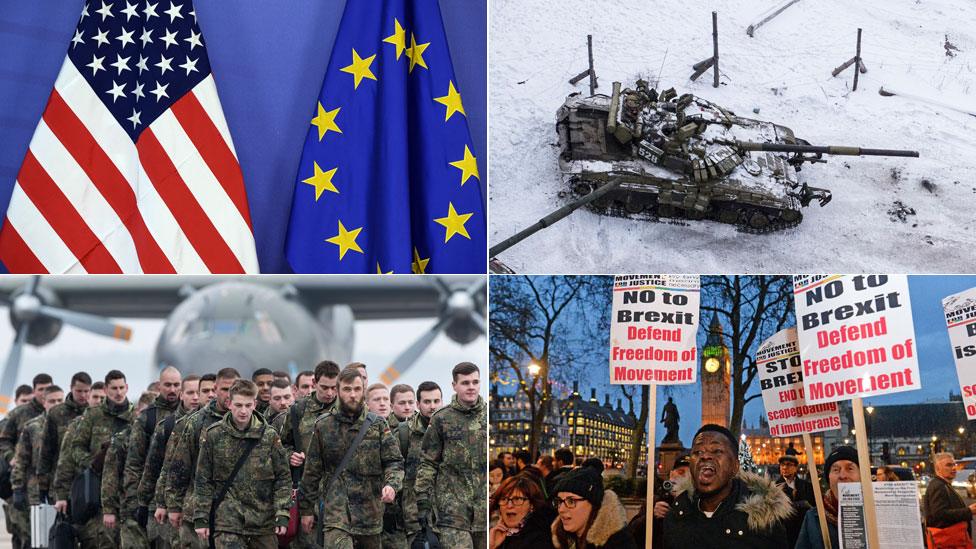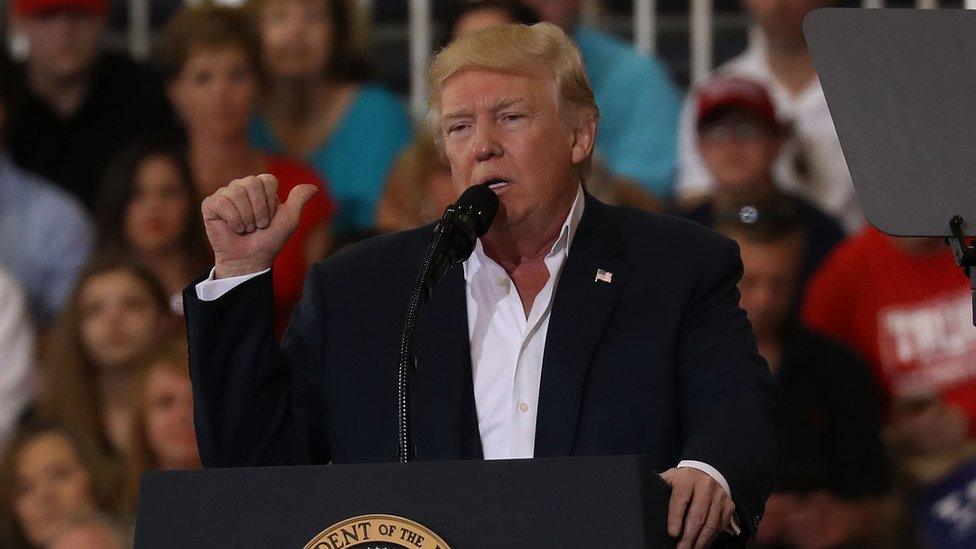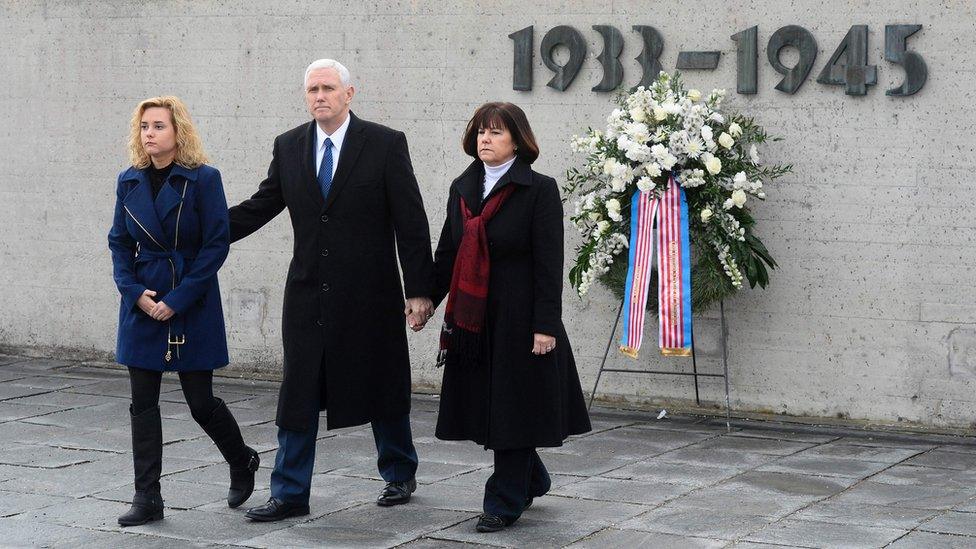Mike Pence warns Nato it must boost defence spending
- Published

Mr Trump's comments on Nato and Brexit have unsettled allies in the EU
US Vice-President Mike Pence has warned members of the Nato alliance to meet their defence spending targets.
Speaking in Brussels, Mr Pence said that the American people could lose patience with Nato members if they did not share the burden of defence.
However, he also sought to reassure European leaders, saying the US remained committed to co-operation and partnership with the European Union.
Mr Trump's comments on Brexit and the role of Nato have unsettled allies.
Why are EU leaders worried?
Donald Trump has been vocal in his criticism of international organisations, including Nato, a defence alliance which was initially formed to meet the military threat to Europe from the Soviet Union.
Mr Trump has described Nato as "obsolete", and criticised members which fail to meet the target of spending 2% of their GDP on defence.

Mr Trump has spoken out in favour of Brexit
He is also seen as friendlier to Russia than his predecessors, and some of his former aides have come under scrutiny for their alleged links with Russia.
Mr Trump has dismissed the EU as "a vehicle for Germany" and spoken out in favour of Brexit, telling the Times newspaper last month that he thought the UK was "so smart in getting out", and predicting that "others will leave".
How much has Trump achieved so far?
Americans assess Trump's first month
MPs debate Trump state visit to UK
Russian media no longer dazzled by Trump
European Commission President Jean-Claude Juncker has said the US needs "a strong, united European Union".
"This is not the moment for Europe to divide itself into former national, provincial categories," he said.
What has Mr Pence said?

Donald Tusk (right) said the meeting with Mike Pence was "truly needed"
The vice-president has been in Brussels for talks with Mr Juncker, Nato Secretary General Jens Stoltenberg, and Donald Tusk, the president of the European Council.
He has sought to reassure EU leaders that, despite Mr Trump's criticism, the US remains committed to working with Europe.
He told leaders it was Mr Trump who told him to visit Brussels and convey the US's "unwavering" support for Nato.
However, he said Nato members had to meet the 2% defence spending target quickly, saying: "America will do our part. But Europe's defence requires Europe's commitment as well as ours."
"The president expects real progress by the end of 2017," he said, adding that "the patience of the American people will not endure forever".

The vice-president, accompanied by his wife and daughter, visited the former Nazi death camp of Dachau on Sunday
On Russia, he said the US would continue to hold it accountable over the Ukraine conflict, though he said that President Trump believed that new common ground could be found with Moscow.
During a press conference, he was asked if he opposed further disintegration of the EU.
Mr Pence did not answer this directly, but said the US shared a "deep heritage" with EU members and were committed to "ongoing co-operation and maintaining that partnership in the years ahead".
Has Mr Pence managed to reassure EU leaders?
Mr Tusk said, external his meeting with Mr Pence was "truly needed", after what he described as "too many new and sometimes surprising opinions" that had been voiced in past months "for us to pretend that everything is as it used to be".
Mr Tusk said Mr Pence had confirmed the US supported "the idea of a united Europe".
EU officials told reporters they were encouraged by the meeting, with one saying "we got everything we were looking for".
However, some officials have remarked privately that they will want to hear the same words from Mr Trump before they feel reassured.
Mr Stoltenberg, meanwhile, said he and Mr Pence agreed on the "importance of higher defence spending and fairer burden sharing" in Nato.
"Europeans cannot ask the US to commit to Europe's defence if they are not willing to commit more themselves."

Analysis by Damian Grammaticas, BBC Europe correspondent
For European leaders this was reassurance, of a sort.
When the US vice-president arrived in Europe at the weekend and didn't mention US backing for the EU it was noted. Now Mr Pence has done so, importantly in the home of the EU's institutions, standing side by side with Mr Tusk and Mr Juncker.
But the fact Europeans were waiting for a US leader to make such a statement is a sign these are uncertain times. And it leaves a nagging feeling among Europeans that they can't be sure President Trump will stick to the same script or differ in his next tweet or unscripted remark.
So for many Europeans the Trump administration remains unpredictable, unclear in its thinking, even divided on key issues.
And Europeans may well wait, putting more store by what a transactional president does, than by what is said. Mr Tusk made a point of telling Vice-President Pence that "Americans and Europeans must... practise what they preach."
